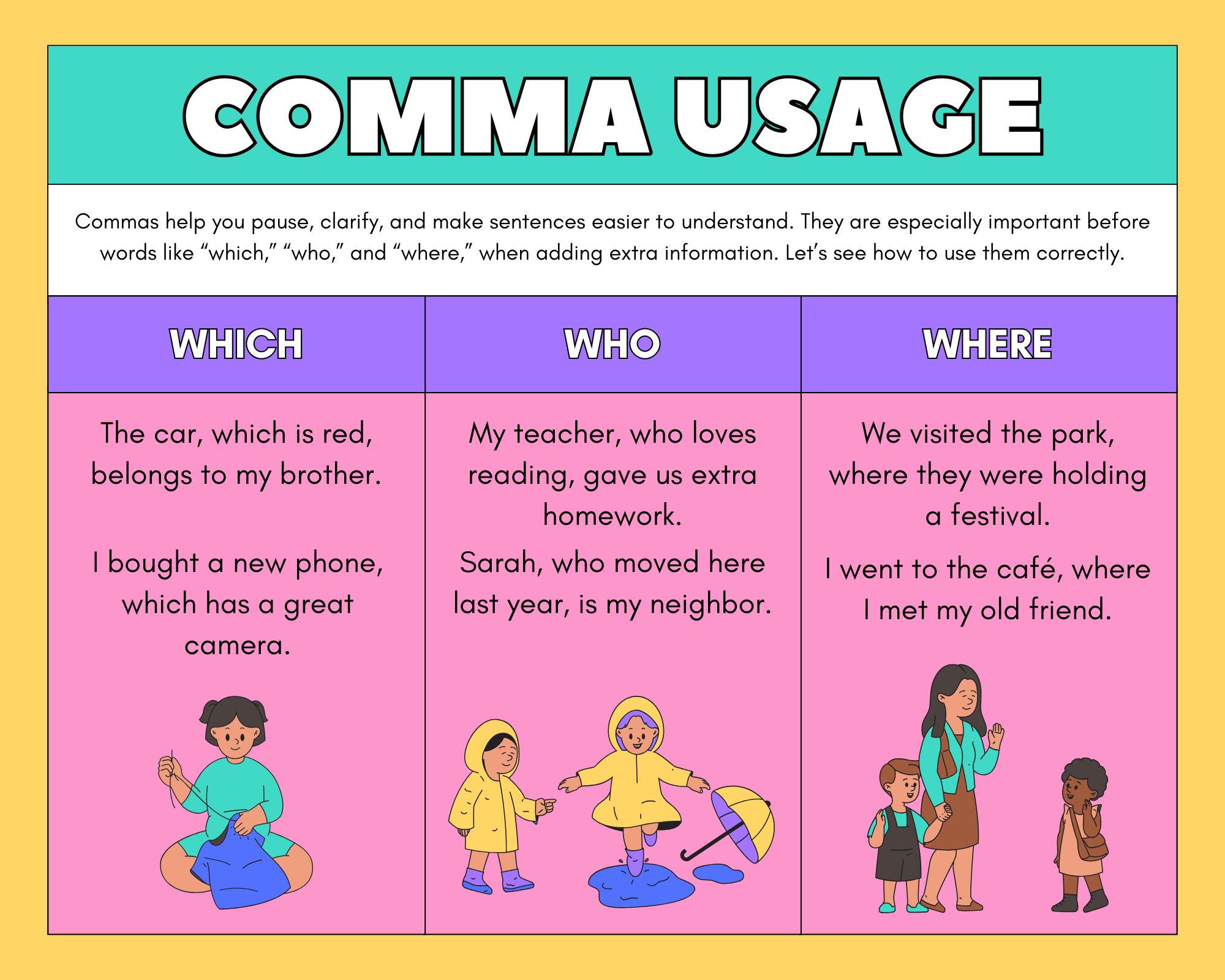Put commas before ‘which, ‘when’ and ‘who’? But How?
Stop struggling with comma rules! Learn exactly when to use commas before 'which,' 'when,' and 'who' with easy-to-follow guidelines.
Looking for help with those confusing comma rules before "which," "when," and "who"?
Many people get stuck when they need to put commas in their sentences.
We learned these basic comma rules back in school but forgot them quickly.
These three words often make us pause and think about comma placement, especially when dealing with different types of sentences.
It's time to learn these simple rules that will make your writing clear.
Let me help you understand when to use commas with easy examples.
Using Commas Before "Which"
Struggling to know when "which" needs those tricky commas? Let's make it simple.
The basic rule is to ask yourself if the information is extra or needed.
When starting a sentence with however, we always need a comma, but "which" follows different rules.
Think of "which" phrases like little side notes you whisper to a friend.
For example: "My phone, which I bought last year, keeps freezing up lately."
If you can remove the "which" part and the sentence still makes sense, use commas.
Here's another example: "The cake, which had chocolate frosting, was already half eaten."
When to Add Commas Before "When"
Do you freeze up every time you need to use "when" in writing?
Time-related sentences shouldn't give you a headache - they follow simple patterns.
Use a comma before "when" if you're joining two complete thoughts together.
Like this: "I was watching TV, when the power suddenly went out."
But leave the comma out if "when" is needed to complete your thought.
Example without comma: "I always get hungry when I smell fresh cookies baking."
Rules for Commas Before "Who"
Think of "who" like introducing someone special at a casual party - easy right?
Put commas around "who" phrases when you're sharing extra details about someone.
For example: "My brother, who lives in London, is visiting us next month."
You could remove "who lives in London" and still have a complete thought.
But sometimes "who" is crucial to your meaning - then skip the commas.
Like this: "Students who finish early can go out for an extra recess."
Practice Examples
Ready to test your new comma skills with some real-world sentences to fix?
Using a paragraph maker can help you practice these rules with different types of sentences.
Try to summarize text from your favorite book and spot these comma patterns.
Here are some examples:
- "The car which broke down yesterday needs to go to the shop."
- "Sarah who works at the bank helped me with my loan application."
- "I was sleeping when my phone started ringing at midnight suddenly."
Fix these sentences using our new rules - want to try?
Common Mistakes to Avoid
People often put commas everywhere just to be safe - don't do that!
Watch out for adding commas when the information is necessary to your meaning.
Remember that not every "which," "when," or "who" needs a comma automatically.
Double-check by asking: "Can I remove this information without changing the meaning?"
If you're unsure, using a grammar checker can help spot common punctuation mistakes and suggest better sentence structure.
Wrapping up
Now you know the simple tricks for using commas with "which," "when," and "who."
Think of commas like small pauses that help your reader understand your message.
Remember our easy test: If you can remove the information, use those commas.
Practice with everyday sentences until these comma rules become natural to you.
And here's your final quick checklist to remember:
- "Which" gets commas when adding extra details
- "When" needs a comma if joining two complete thoughts
- "Who" wants commas when giving bonus information about someone
Need more practice? Let's try these final examples:
- My sister who works as a nurse loves her new job. (Fix this!)
- The movie which we saw yesterday was three hours long. (Where do commas go?)
- I was reading a book when someone knocked on my door. (Try this one!)

